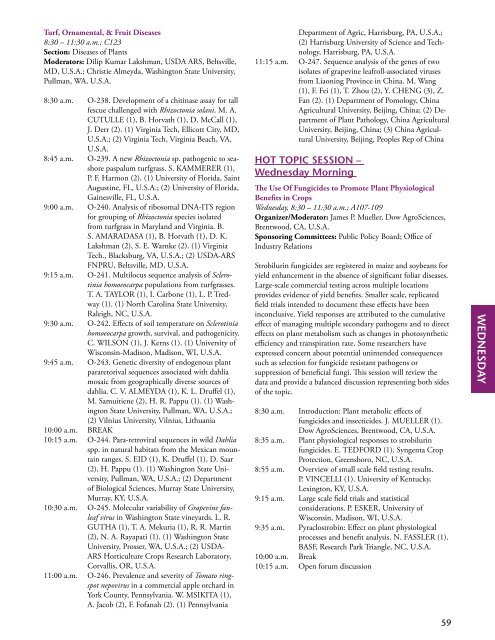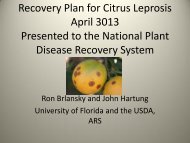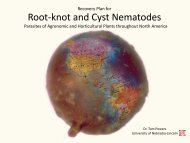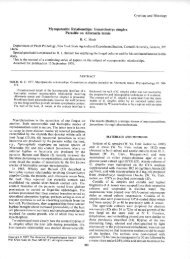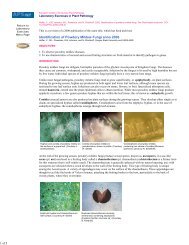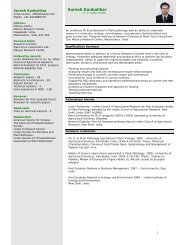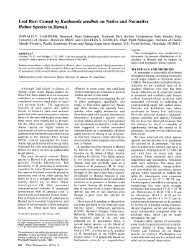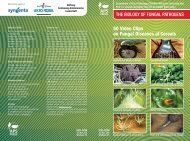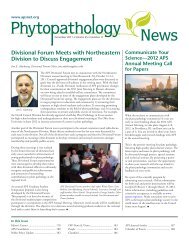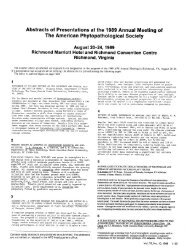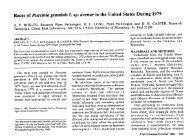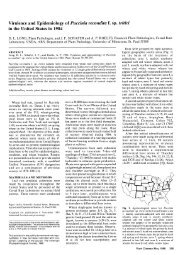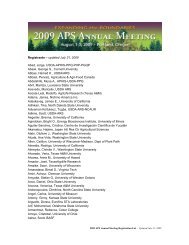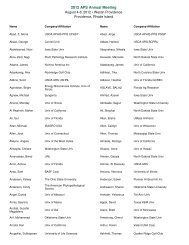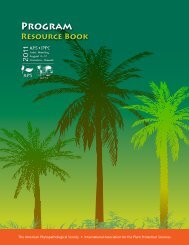Annual Meeting Program Book - American Phytopathological Society
Annual Meeting Program Book - American Phytopathological Society
Annual Meeting Program Book - American Phytopathological Society
You also want an ePaper? Increase the reach of your titles
YUMPU automatically turns print PDFs into web optimized ePapers that Google loves.
Turf, Ornamental, & Fruit Diseases<br />
8:30 – 11:30 a.m.; C123<br />
Section: Diseases of Plants<br />
Moderators: Dilip Kumar Lakshman, USDA ARS, Beltsville,<br />
MD, U.S.A.; Christie Almeyda, Washington State University,<br />
Pullman, WA, U.S.A.<br />
8:30 a.m. O-238. Development of a chitinase assay for tall<br />
fescue challenged with Rhizoctonia solani. M. A.<br />
CUTULLE (1), B. Horvath (1), D. McCall (1),<br />
J. Derr (2). (1) Virginia Tech, Ellicott City, MD,<br />
U.S.A.; (2) Virginia Tech, Virginia Beach, VA,<br />
U.S.A.<br />
8:45 a.m. O-239. A new Rhizoctonia sp. pathogenic to seashore<br />
paspalum turfgrass. S. KAMMERER (1),<br />
P. F. Harmon (2). (1) University of Florida, Saint<br />
Augustine, FL, U.S.A.; (2) University of Florida,<br />
Gainesville, FL, U.S.A.<br />
9:00 a.m. O-240. Analysis of ribosomal DNA-ITS region<br />
for grouping of Rhizoctonia species isolated<br />
from turfgrass in Maryland and Virginia. B.<br />
S. AMARADASA (1), B. Horvath (1), D. K.<br />
Lakshman (2), S. E. Warnke (2). (1) Virginia<br />
Tech., Blacksburg, VA, U.S.A.; (2) USDA-ARS<br />
FNPRU, Beltsville, MD, U.S.A.<br />
9:15 a.m. O-241. Multilocus sequence analysis of Sclerotinia<br />
homoeocarpa populations from turfgrasses.<br />
T. A. TAYLOR (1), I. Carbone (1), L. P. Tredway<br />
(1). (1) North Carolina State University,<br />
Raleigh, NC, U.S.A.<br />
9:30 a.m. O-242. Effects of soil temperature on Sclerotinia<br />
homoeocarpa growth, survival, and pathogenicity.<br />
C. WILSON (1), J. Kerns (1). (1) University of<br />
Wisconsin-Madison, Madison, WI, U.S.A.<br />
9:45 a.m. O-243. Genetic diversity of endogenous plant<br />
pararetorival sequences associated with dahlia<br />
mosaic from geographically diverse sources of<br />
dahlia. C. V. ALMEYDA (1), K. L. Druffel (1),<br />
M. Samuitiene (2), H. R. Pappu (1). (1) Washington<br />
State University, Pullman, WA, U.S.A.;<br />
(2) Vilnius University, Vilnius, Lithuania<br />
10:00 a.m. BREAK<br />
10:15 a.m. O-244. Para-retroviral sequences in wild Dahlia<br />
spp. in natural habitats from the Mexican mountain<br />
ranges. S. EID (1), K. Druffel (1), D. Saar<br />
(2), H. Pappu (1). (1) Washington State University,<br />
Pullman, WA, U.S.A.; (2) Department<br />
of Biological Sciences, Murray State University,<br />
Murray, KY, U.S.A.<br />
10:30 a.m. O-245. Molecular variability of Grapevine fanleaf<br />
virus in Washington State vineyards. L. R.<br />
GUTHA (1), T. A. Mekuria (1), R. R. Martin<br />
(2), N. A. Rayapati (1). (1) Washington State<br />
University, Prosser, WA, U.S.A.; (2) USDA-<br />
ARS Horticulture Crops Research Laboratory,<br />
Corvallis, OR, U.S.A.<br />
11:00 a.m. O-246. Prevalence and severity of Tomato ringspot<br />
nepovirus in a commercial apple orchard in<br />
York County, Pennsylvania. W. MSIKITA (1),<br />
A. Jacob (2), F. Fofanah (2). (1) Pennsylvania<br />
Department of Agric, Harrisburg, PA, U.S.A.;<br />
(2) Harrisburg University of Science and Technology,<br />
Harrisburg, PA, U.S.A.<br />
11:15 a.m. O-247. Sequence analysis of the genes of two<br />
isolates of grapevine leafroll-associated viruses<br />
from Liaoning Province in China. M. Wang<br />
(1), F. Fei (1), T. Zhou (2), Y. CHENG (3), Z.<br />
Fan (2). (1) Department of Pomology, China<br />
Agricultural University, Beijing, China; (2) Department<br />
of Plant Pathology, China Agricultural<br />
University, Beijing, China; (3) China Agricultural<br />
University, Beijing, Peoples Rep of China<br />
hoT ToPIC sessIon –<br />
Wednesday Morning<br />
The Use Of Fungicides to Promote Plant Physiological<br />
Benefits in Crops<br />
Wednesday, 8:30 – 11:30 a.m.; A107-109<br />
Organizer/Moderator: James P. Mueller, Dow AgroSciences,<br />
Brentwood, CA, U.S.A.<br />
Sponsoring Committees: Public Policy Board; Office of<br />
Industry Relations<br />
Strobilurin fungicides are registered in maize and soybeans for<br />
yield enhancement in the absence of significant foliar diseases.<br />
Large-scale commercial testing across multiple locations<br />
provides evidence of yield benefits. Smaller scale, replicated<br />
field trials intended to document these effects have been<br />
inconclusive. Yield responses are attributed to the cumulative<br />
effect of managing multiple secondary pathogens and to direct<br />
effects on plant metabolism such as changes in photosynthetic<br />
efficiency and transpiration rate. Some researchers have<br />
expressed concern about potential unintended consequences<br />
such as selection for fungicide resistant pathogens or<br />
suppression of beneficial fungi. This session will review the<br />
data and provide a balanced discussion representing both sides<br />
of the topic.<br />
8:30 a.m. Introduction: Plant metabolic effects of<br />
fungicides and insecticides. J. MUELLER (1).<br />
Dow AgroSciences, Brentwood, CA, U.S.A.<br />
8:35 a.m. Plant physiological responses to strobilurin<br />
fungicides. E. TEDFORD (1). Syngenta Crop<br />
Protection, Greensboro, NC, U.S.A.<br />
8:55 a.m. Overview of small scale field testing results.<br />
P. VINCELLI (1). University of Kentucky,<br />
Lexington, KY, U.S.A.<br />
9:15 a.m. Large scale field trials and statistical<br />
considerations. P. ESKER, University of<br />
Wisconsin, Madison, WI, U.S.A.<br />
9:35 a.m. Pyraclostrobin: Effect on plant physiological<br />
processes and benefit analysis. N. FASSLER (1).<br />
BASF, Research Park Triangle, NC, U.S.A.<br />
10:00 a.m. Break<br />
10:15 a.m. Open forum discussion<br />
59<br />
WednesdaY


